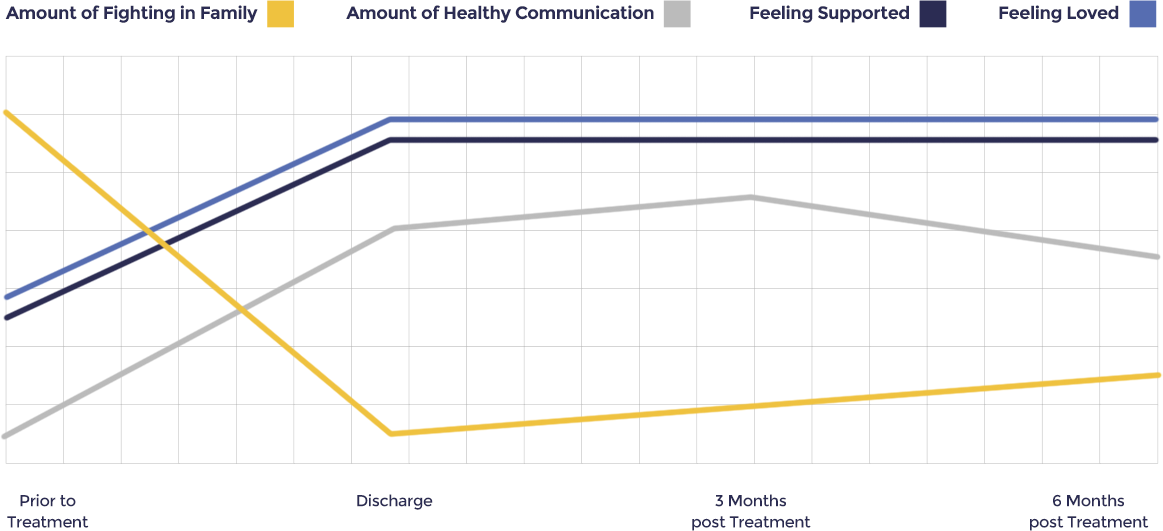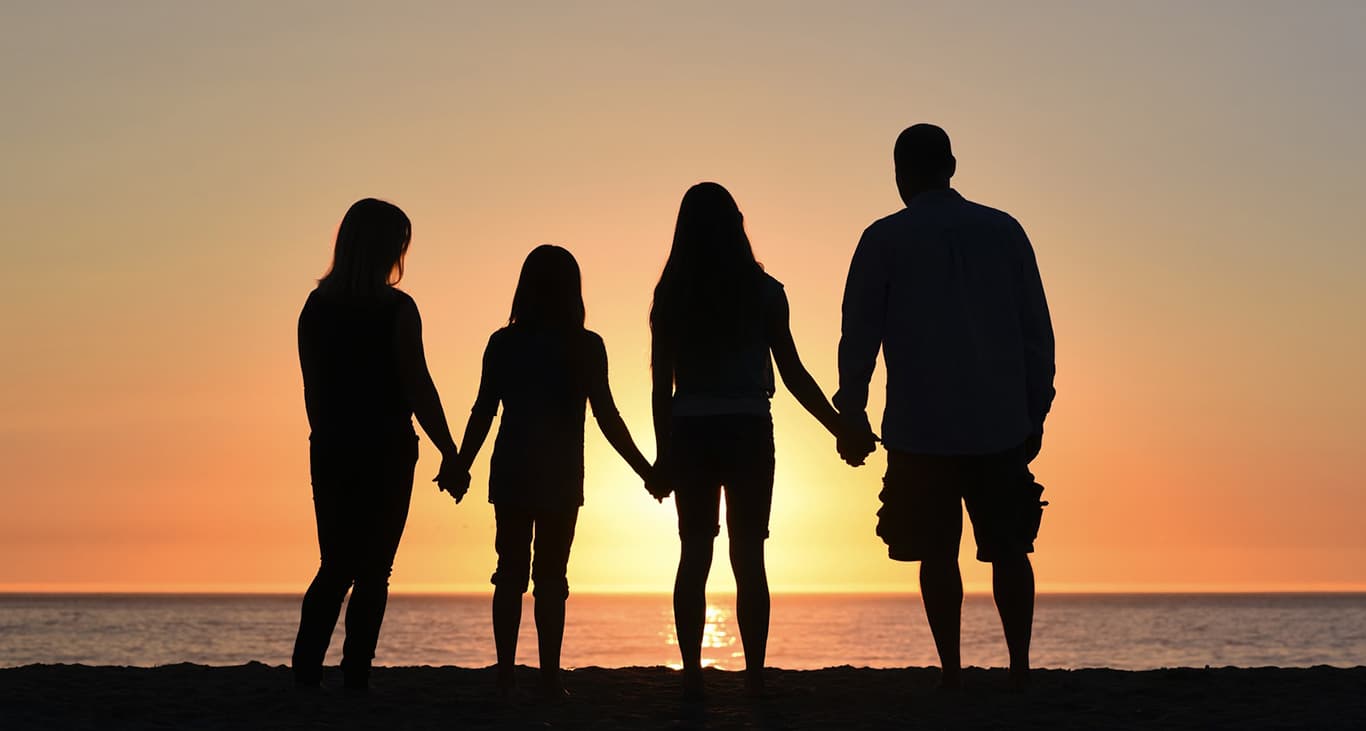What True Unconditional Love Means for Young Adults
Reading Time: 6 minutesWe all want to be loved unconditionally—to be loved despite not being perfect. True unconditional love, whether it’s between family members, friends, or romantic partners, supports us to be our best self. When we know we are unconditionally loved, we can go out into the world with confidence and a sense of security. Furthermore, research shows that unconditional love strengthens our immunity and our ability to handle stress.
But unconditional love isn’t always easy to find or to give. Our very first relationships—the ones we form with our parents or caregivers—play a huge part in determining what our future relationships will be like. And if those childhood experiences were difficult or traumatic, young adults may struggle with relationships outside the family as well.
Fortunately, we can develop true unconditional love in our closest relationships even if we didn’t grow up with it. Building authentic, supportive connections starts with learning how to recognize the signs of unconditional love versus the signs of unhealthy relationships and codependency.
What Is Unconditional Love in a Relationship?
Unconditional love in a relationship means that we can be our true selves with the other person, without fear that we’ll be abandoned if we do or say something they don’t like. Rather than judging or scorning each other for our flaws or missteps, we give and receive compassion and acceptance. It’s love with no strings attached.
"Unconditional love in a relationship means that we can be our true selves with the other person, without fear that we’ll be abandoned if we do or say something they don’t like.
That’s not to say that unconditionally loving relationships never confront challenges and obstacles. All intimate relationships, whether romantic or platonic, hit bumps along the way. But in relationships where people love each other unconditionally, they’re committed to working through the rough patches.
On the other hand, conditional love means that we need to meet the other person’s expectations or standards in order to feel sure of their love and support. When love is conditional, there’s a sense that it’s not okay to be yourself—you need to live up to an impossible ideal in order to “deserve” love. This sets up a dysfunctional dynamic that’s not good for either person in the relationship.
How the Parent-Child Connection Affects Young Adult Relationships
The original parent-child connection has a powerful impact on an individual’s ability to forge positive relationships in adulthood. “The nature of the original attachment bond between a child and their parents (or primary caregivers) is critical,” says Barbara Nosal, PhD, LMFT, LADC, Newport Institute’s Chief Clinical Officer. “It determines a child’s ability to form authentic connections, and determines how easily that child will be able to make authentic connections as a teenager and an adult.”
In fact, research shows that the parts of the brain that are activated by unconditional love are similar to those that light up in response to maternal love. “The rewarding nature of unconditional love facilitates the creation of strong emotional links,” says researcher Mario Beauregard of Montreal University.
When parents accept, love, and show affection to their children—even when the children make mistakes or fall short of expectations—this is true unconditional love. And receiving this kind of love sets children up for similar relationships later in life. Moreover, children who receive family unconditional love have healthier brain development, better stress resilience, and a stronger immune system.
Know the Facts
Research shows that the parts of the brain that are activated by unconditional love are similar to those that light up in response to maternal love.
On the other side of the spectrum, conditional parenting gives children the message that they must earn their parents’ love. Therefore, they feel they need to fulfill certain expectations in order to receive affection and approval. As a result, children may grow up feeling unworthy of love. That self-doubt stays with them when they reach adulthood, and it can have negative mental and physical health repercussions. A study of 756 young and middle adults found that those who experienced a lack of affection in childhood were more stressed and had greater disease risk than those who received warmth and affection from their parents.


Healing from Early Childhood Trauma and Co-Occurring Disorders
A lack of true unconditional love in childhood isn’t just challenging—it’s traumatic. This type of trauma is known as relational trauma. Children who feel that parental love may be taken away at any moment experience chronic, ongoing anxiety and stress. And these feelings don’t usually go away as they get older. Instead, they tend to manifest as mental health issues such as depression, substance abuse, or other co-occurring disorders. In addition, young adults may be continually drawn into codependent relationships with friends or romantic partners, because they keep returning to familiar relationship patterns.
This stage of life is often a time when people begin to grapple with traumatic childhood experiences and unhealthy relationships with parents. If young adults enter treatment for depression or substance abuse, part of their healing work may be repairing the disruptions in their relationships with parents. Sometimes they discover that what they believed was family unconditional love is actually codependency.
As a result, emerging adults may need to create healthier boundaries in their relationships with parents. Moreover, the recovery journey may involve redefining what true unconditional love—for oneself and for others—means to them.
How Do You Love Someone Unconditionally?
Recognizing the signs of unconditional love and the warning signs of conditional love can help young adults nurture healthy relationships. Here’s what unconditional love does and doesn’t mean.
Unconditional love doesn’t mean:
- Doing everything the other person wants you to do, and expecting them to do the same
- Accepting anything the other person does without protest, even if it’s hurtful to you or them
- Disguising demands and conditions as wanting the best for you (“I’m only telling you this for your own good”)
- Believing that someone “owes” you love, and that every offering of love must be equally returned
- Staying in a friendship or relationship even when it’s unhealthy for you.
Unconditional love does mean:
- Having healthy boundaries and practicing self-care
- Being able to state what you really want and need without fear of repercussions
- Giving and receiving kindness, compassion, and understanding
- Loving and caring for yourself as much or more as you love the other person
- Expressing dissatisfaction or disagreement with respect and without ultimatums
- Feeling that you can be your true self
- Accepting the other person as their true self.
Unconditional Self-Love and Self-Compassion
Young adults who did not receive unconditional love as children are often very hard on themselves. Because they don’t feel worthy of affection, they find it difficult to accept themselves as they are and forgive themselves for their mistakes. Moreover, they are more likely to stay in harmful relationships, as they don’t believe they deserve something better.
Hence, cultivating unconditional self-love and self-compassion is key in learning to love others unconditionally and receive true unconditional love. Research on self-compassion shows that this quality is linked to a greater ability to get along with others, more social connectedness, and faster emotional recovery after the end of a relationship. That’s why effective mental healthcare for young adults helps them “build the muscle” of self-compassion.
Young Adult Treatment at Newport Institute
At Newport Institute, we give clients unconditional love until they can love themselves. Recognizing that true unconditional self-love is essential for sustainable recovery, our integrated treatment supports young adults in cultivating both self-compassion and compassion for others.
- Individual therapy, using modalities such as Trauma-Focused Cognitive Behavioral Therapy and EMDR, helps young adults build self-awareness and process childhood relational trauma.
- Group sessions and experiential modalities like Adventure Therapy guide young people to develop empathy and trust—essential ingredients for healthy and fulfilling relationships.
- Family therapy helps heal long-standing wounds inflicted by relational trauma in childhood.
In researching the outcomes of our evidence-based treatment, Newport Institute tracks 15 different treatment goals regarding family, academics, and overall behavior. Through this data collection, we have found that young people experience significant increases in feelings of love and support during treatment with us. These levels continue to increase for three to six months upon discharge from the program. Further, family interactions improve dramatically during and after treatment.


